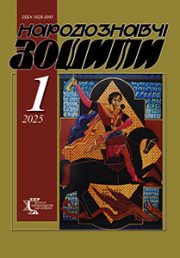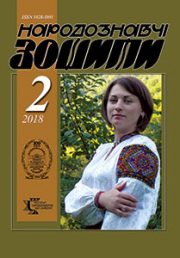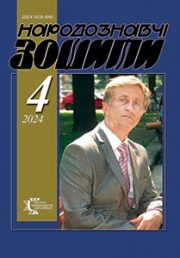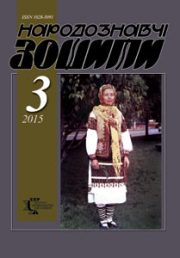The Ethnology Notebooks. 2023. № 2 (170), 273—286
UDK[39:[572:314.7]:001.891]-057.4І.Марков(477)(092)
DOI https://doi.org/10.15407/nz2023.02.273
IHOR MARKOV’S SOCIAL ANTHRIPOLOGY: AN UNFINISHED PATH (the practice and theory of migration studies)
CHORNIY Petro
- ORCID ID https://orcid.org/0000-0002-4521-9597
- PhD in History, Senior Research Fellow,
- Institute of Ethnology, National Academy of Sciences of Ukraine,
- Department of Social Anthropology,
- 15, Svobody Avenue, 79000, Lviv, Ukraine,
- e-mail: p.chorniy@gmail.com
SUDYN Danylo
- ORCID ID https://orcid.org/0000-0001-5648-0224
- PhD in Sociology,
- Associate Professor at Sociology Department
- Ukrainian Catholic University;
- Research Fellow,
- Institute of Ethnology, National Academy of Sciences of Ukraine,
- Department of Social Anthropology,
- 15, Svobody Avenue, 79000, Lviv, Ukraine,
- e-mail: dansudyn@gmail.com
ZAREMBA-KOSOVYCH Hanna
- ORCID ID https://orcid.org/0000-0003-3984-879X
- PhD in Sociology, Research Fellow,
- Institute of Ethnology, National Academy of Sciences of Ukraine,
- Department of Social Anthropology,
- 15, Svobody Avenue, 79000, Lviv, Ukraine,
- Contacts: e-mail: ganna.zaremba@gmail.com
Abstract. The article provides an overview of the life and work of Ihor Markov, the founder and first head of the Department of Social Anthropology at the Institute of Ethnology of the National Academy of Sciences of Ukraine. The path of his personal development is described. It was found out what influenced the formation of his worldview and scientific interests.
The main attention is paid to the analysis of the scientific output of the scientist, foremost in the field of migration studies, which Ihor Markov has been engaged in for over 20 years. He managed to form his own research optics, through which he perceived, analyzed and studied Ukrainian society on a daily basis, and most importantly, he viewed every Ukrainian as «person in motion» and «person in action» constantly changing.
In his researches Ihor Markov showed that the most important feature of modern migrations is the transformation of the world of individual states, economies and cultures into a common social space, which globalization actively contributed too and one of the most important characteristics of the new era has become transnational migrations. Based on this, he came to the conclusion that in modern Ukrainian migration, with its characteristic temporality, can be singled out into a new fifth wave of migration, compared to the previous four waves, thereby starting a discussion on this topic among migration researchers.
Keywords: Ihor Markov, Department of Social Anthropology, migration, sociodynamics, identity, man in motion, man in action.
Received 5.04.2023
REFERENCE
- Markov, I. Self-restraint and freedom. Zbruc. Retrieved from: https://zbruc.eu/node/112317 (last viewed: 03.03.2023) [in Ukrainian].
- Markov, I., & Tanchyn, I. «Heneza» — is an epoch-making phenomenon. Zbruc. Retrieved from: https://zbruc.eu/node/74881 (last viewed: 03.03.2023) [in Ukrainian].
- Markov, I. (2015). Globalization and migrations: theoretical and methodological aspects of studies on sociodynamics. The Ethnology notebooks, 6 (126), 1220—1230 [in Ukrainian].
- Scientific seminar «Migration trends of Ukrainian youth in the context of the mobilities of the modern world» (Organizers: International Institute of Education, Culture and Diaspora Relations of the National University «Lviv Polytechnic»; Department of Social Anthropology of the Institute of Ethnology of the National Academy of Sciences of Ukraine). Lviv, march 22, 2018 [in Ukrainian].
- Markov, I., Odynets, S., Sudyn, D., Pitkanen, P., & Korpela, M. (2 eds.). (2018). Ukraine and Temporary Migration in European-Asian Transnational Space. Characteristics of Temporary Migration in European-Asian Transnational Social Spaces (Pp. 161—175). Dortrecht: Springer. Retrieved from: https://doi.org/10.1007/978-3-319-61258-4_9
- Chorniy, P., Markov, I., Sudyn, D., Zaremba-Kosovych, G., & Pitkanen, P. (Ed.). (2019). Characteristics and development impact of temporary migration: The case of Ukraine. Temporary Migration, Transformation and Development: Evidence from Europe and Asia (Pp. 165—188). London: Routledge. Retrieved from: https://doi.org/10.4324/9780429244346
- (2015). The Ethnology notebooks, 6. Retrieved from: https://nz.lviv.ua/2015-6/ (last viewed: 17.03.2023) [in Ukrainian].







